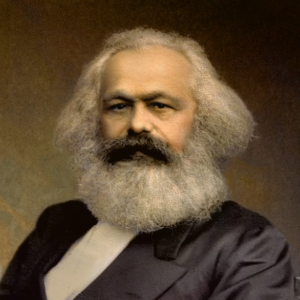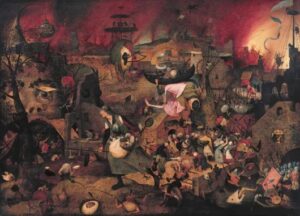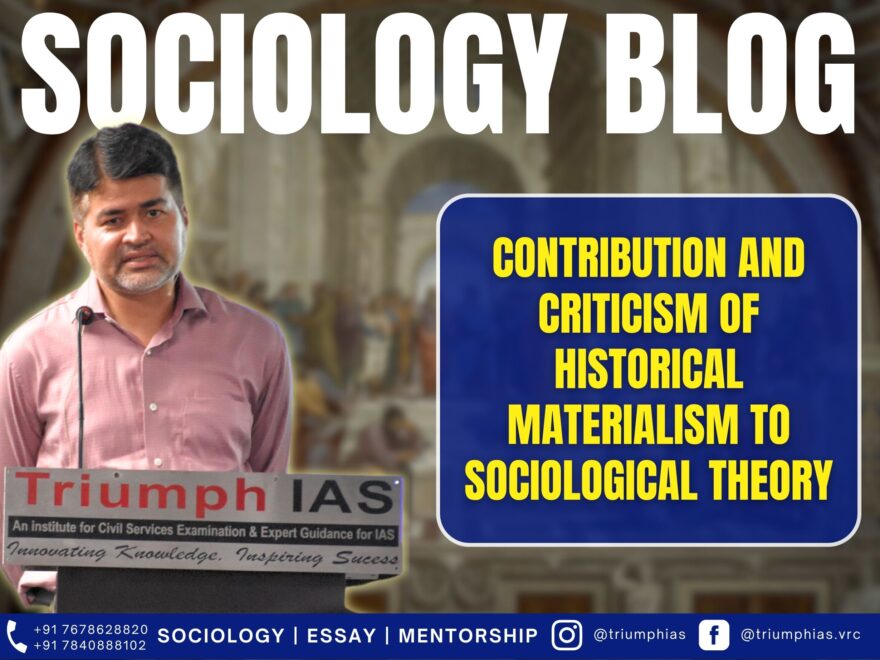
“The history of all hitherto existing society is the history of class struggles.”
Historical Materialism
Relevent for Sociology Paper 1 (Unit 4)
Contribution and Criticism Historical Materialism to Sociological Theory.
- The theory of historical materialism played a pivotal role in shaping modern sociology. While earlier thinkers like Hegel, Saint-Simon, and Adam Ferguson had laid the groundwork for Marx’s ideas, it was Marx who brought greater precision and empirical evidence to his analysis. He introduced a novel element to understanding society by focusing on the relationships between social classes, which were determined by the mode of production. This aspect of historical materialism gained widespread acceptance among later sociologists, as it offered a more promising foundation for investigating the causes of social change with accuracy and realism.
- Historical materialism revolutionized sociology by introducing a new method of inquiry, new concepts, and daring hypotheses to explain the emergence, evolution, and decline of different societal forms. In the latter part of the nineteenth century, these contributions exerted a profound and far-reaching influence on the writings of sociologists.
- What made historical materialism truly distinctive was its ambitious endeavor to critically synthesize the entire understanding of human development’s conditions. It aspired to establish a system based on rational planning, cooperative production, equitable distribution, and, most importantly, liberation from all forms of political and social exploitation.
- Moreover, historical materialism not only offers a method for comprehending the current social reality, but it also serves as a critical lens through which the aims and methods of the social sciences can be evaluated persistently. It challenges and critiques existing approaches in the field.

Criticism of Historical materialism
- The philosophical foundation of Marxism is firmly rooted in materialism, rejecting the notions of religion and a divine influence on human emotions and beliefs. Marx holds a narrow view of human nature, portraying individuals as inherently selfish and driven solely by their class interests. However, it is important to recognize that alongside self-interest, humans also possess sentiments of cooperation, sacrifice, love, and sympathy, which Marx tends to overlook. Renowned socialist J.P. Narayan aptly points out that when people begin to question their morality, traditions, and philanthropic activities, materialism fails to provide satisfactory answers to these concerns.
- According to Marxist thinkers, dialectical materialism serves as a comprehensive framework capable of explaining various processes of change. This methodology is considered scientific and universal, as it enables the analysis of diverse transformations. Max Weber acknowledged the influence of Marx’s work, acknowledging that changes in the economic structure (infrastructure) can indeed lead to changes in human relations and consciousness (superstructure). However, it is also plausible that changes in superstructures, such as religion, can in turn bring about alterations in the economic infrastructure, as demonstrated by Weber’s theory of “Protestant ethics and the spirit of capitalism.”
- Similarly, G. Myrdal argues that the state and its policies play a significant role in driving change, and state intervention can impact the economic infrastructure. On the other hand, Melovan Djilas criticizes Marx for being a utopian thinker, asserting that the ideal communist society envisioned by Marx never materialized, and the existing communist societies deviate from the core principles of Marxian ideology.
To master these intricacies and fare well in the Sociology Optional Syllabus, aspiring sociologists might benefit from guidance by the Best Sociology Optional Teacher and participation in the Best Sociology Optional Coaching. These avenues provide comprehensive assistance, ensuring a solid understanding of sociology’s diverse methodologies and techniques
historical materialism, sociological theory, social change, Marx, social classes, mode of production, rational planning, exploitation, criticism, dialectical materialism, economic infrastructure, superstructure
Follow us :
🔎 https://www.instagram.com/triumphias
🔎https://www.youtube.com/c/TriumphIAS
https://t.me/VikashRanjanSociology
Find More Blogs
|
Scope of the subject and comparison with other social sciences |
|||
|
|
|
|
Modernity and social changes in Europe |

